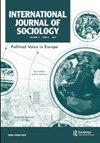‘Dark Cloud with a Silver Lining’? The Prospect of a Rise in Material Values or a Post-Material Turn in Post-Pandemic South Africa
IF 1.8
Q2 SOCIOLOGY
引用次数: 1
Abstract
Abstract The quarter century following the historic 1994 elections in South Africa and the establishment of a democratic dispensation was a period of transformative change. During this time, nation-building efforts were undertaken as a means of promoting redress, overcoming the country’s colonial, segregationist and apartheid past, and challenging traditions of racialised citizenship. Progressive legislation was adopted that challenged traditional apartheid-based norms and laid the foundation for a fairer society based on the principles of “ubuntu”, encouraging a sense of community-oriented reciprocity. However, the policy choices made by the post-apartheid state have not translated into economic opportunities for millions of South Africans. Poverty, unemployment and inequality persist as pressing societal concerns, which has fostered widespread disenchantment and forced many to depend on survivalist strategies. This has created barriers to the attainment of a more caring society. The COVID-19 pandemic has deeply affected South African society, with a hard national lockdown triggering untold suffering and what promises to be one of the worst economic recessions. This article uses historical and current data to draw inferences about the likely impact of COVID-19 on South Africa. It considers whether the country’s post-pandemic society will be characterized by a rise in materialistic values or alternatively new demands for a more humane society.“乌云中有一线光明”?大流行后南非物质价值上升或后物质转向的前景
1994年南非举行历史性选举并建立民主制度后的四分之一世纪是一个变革的时期。在此期间,进行了国家建设努力,作为促进纠正、克服该国过去的殖民、种族隔离和种族隔离的手段,并挑战种族化的公民身份传统。通过了进步立法,挑战以种族隔离为基础的传统规范,为建立一个以“乌班图”原则为基础的更加公平的社会奠定了基础,鼓励一种面向社区的互惠意识。然而,后种族隔离国家做出的政策选择并没有转化为数百万南非人的经济机会。贫困、失业和不平等仍然是紧迫的社会问题,这导致了普遍的幻想破灭,迫使许多人依赖于生存主义策略。这对实现一个更有爱心的社会造成了障碍。新冠肺炎大流行对南非社会造成了深刻影响,严厉的全国封锁引发了难以估量的痛苦,并有望成为最严重的经济衰退之一。本文使用历史和当前数据来推断COVID-19对南非可能产生的影响。它考虑的是,大流行后的国家社会是否会以物质主义价值观的上升为特征,或者是对更人道的社会的新要求。
本文章由计算机程序翻译,如有差异,请以英文原文为准。
求助全文
约1分钟内获得全文
求助全文

 求助内容:
求助内容: 应助结果提醒方式:
应助结果提醒方式:


